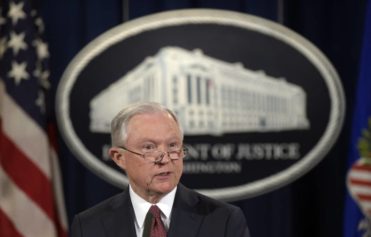
Attorney General Jeff Sessions calls sentencing reform a ‘grave error’ (AP Photo/Susan Walsh, File)
Attorney General Jeff Sessions is back at it again. After quietly waging a second “War on Drugs,” he’s now turned his sights to criminal sentencing reform, firmly standing against the Sentencing Reform and Corrections Act, despite bipartisan support in Congress.
First introduced last fall, on February 14 the U.S. Senate Judiciary Committee voted 16-5 in favor of the bill, allowing it to move forward for a potential vote in the Senate. If implemented, it would eliminate the infamous three-strikes mandatory life in prison rules, reduce mandatory minimum sentences for drug crimes, and give judges more leeway during the sentencing process for nonviolent offenders, actions that Sessions claims would be a “grave error.”
Penning a letter of opposition to the committee, Sessions wrote, “In recent years, convicted drug traffickers and other violent criminals have received significant sentencing breaks from the federal courts and the United States Sentencing Commission. Passing this legislation to further reduce sentences for drug traffickers in the midst of the worst drug crisis in our nation’s history would make it more difficult to achieve our goals and have potentially dire consequences.
“The bill weakens penalties for repeat, serious drug traffickers, including those who used a gun and those with significant criminal histories, and would reduce the sentences of and potentially allow for the early release of many dangerous felons in prison now, including heroin traffickers, firearms felons, and those who are members of violent drug cartels and gangs like MS-13,” he added.
Long opposed to sentencing reform of any kind, during his 20-year tenure in the Senate, Sessions crafted a reputation for being “tough on crime,” a position he’s hung onto since assuming the role of attorney general. But the tide has finally started to shift, as a number of Democrats and Republicans alike have recently come together to make progress on criminal justice reform regardless of what Sessions may think. That includes prominent Republican Chuck Grassley, current leader of the Senate Judiciary Committee and co-sponsor of the bill.
Recently taking to Twitter to denounce Sessions’ response, the Iowa senator tweeted, “Incensed by Sessions letter and attempt to undermine Grassley/Durbin/Lee BIPARTISAN criminal justice reforms. This bill deserves thoughtful consideration before my committee. AGs execute laws, Congress writes them!”
In a prepared statement to the committee, Grassley explained, “When I read his letter, it was almost as if Senator Sessions was back on the Judiciary Committee. But that’s the problem. He is now the Attorney General and is charged with executing the laws that Congress passes, not interfering with the legislative process. … Certainly we value input from the Department of Justice, but if General Sessions wanted to be involved in marking up this legislation, maybe he should have quit his job and run for the Republican Senate seat in Alabama.”
Democratic Vermont Senator Patrick Leahy expanded on Grassley’s remarks, saying, “We don’t have to report to the Justice Department. We’re 100 individual senators, and we can make up our own mind.”
The bill still faces hurdles ahead, even with bipartisan support, with groups like the Fraternal Order of Police speaking out against it. Sending a letter of their own signed by national President Chuck Canterbury, the group wrote, “At a time when our nation is being ravaged by an epidemic of overdose from the use of heroin and opioids, it seems at variance with common sense and sound policy to drastically reduce sentences for drug traffickers and then apply these reduced sentences retroactively.
“This same troubling approach was taken by the previous Administration and thousands of offenders benefitted from early release without any consideration to the impact on public safety. We cannot explain why proponents of this bill seek to repeat this same error,” Canterbury added.
But in fact, while the bill would reduce sentences for nonviolent drug offenses, it would also include mandatory minimum sentences for a number of crimes, including those that support terrorists or involve drug trafficking of fentanyl-tainted heroin, a dangerous drug that is the culprit in a rising number of overdoses and opioid deaths across the country.
Without additional support from the Trump administration, however, the bill might not get much traction, a turn of events that could put Congress and the White House at odds as the Senate Judiciary Committee continues to push forward — trying again for the second time in two years.
Although Press Secretary Sarah Huckabee Sanders has yet to offer a response, according to a report from Axios, both Sessions and Trump are wary of appearing weak on crime. While Trump’s State of the Union address signaled that he is in favor of prison reform, revamping sentencing guidelines is an option the White House isn’t willing to put on the table.
During a recent meeting with advocates for prison reform, Trump explained, “We have a great interest in helping them turn their lives around, get a second chance, and make our community safe. Many prisoners end up returning to crime, and they end up returning to prison. Two-thirds of the 650,000 people released from prison each year are arrested again within three years.”
“We can help break this vicious cycle through job training — very important, job training — mentoring, and drug addiction treatment. And you know how we’re focused on drugs pouring into our country and drug addiction. It’s a big problem even as we speak of this subject. We’ll be very tough on crime, but we will provide a ladder of opportunity to the future,” he continued.
In short, he’s open to discussing changes within the actual prison system but will not commit to anything that allows nonviolent offenders to be released early or have their sentences reduced. In short, it does nothing for those that have been harshly sentenced.
Behind the scenes, Trump’s son-in-law Jared Kushner has taken a similar stance. While he’s personally endorsed legislative change that would overhaul sentencing guidelines — including removing the three-strikes mandate — publicly he has accepted that comprehensive changes of this kind will not be embraced by the current administration, forcing him to focus his efforts on prison reform that would only focus on programs designed to help prisoners re-enter the workforce. This breaks away from both the House and Judiciary Committees, which have advocated for programs that include sentencing reform.
Previously, Senate Majority Leader Mitch McConnell has refused to allow similar measures to come to a vote, but Grassley and 20 other co-sponsors have persisted despite McConnell’s history. Grassley recently told Axios, “I’ve carried a lot of water for the White House. They ought to give some consideration for the close working relationship we’ve had on issues we agree on. I think people at the White House have not wanted to go against Sessions. … This is an opportunity for a bipartisan victory by the President of the United States,” he explained.


